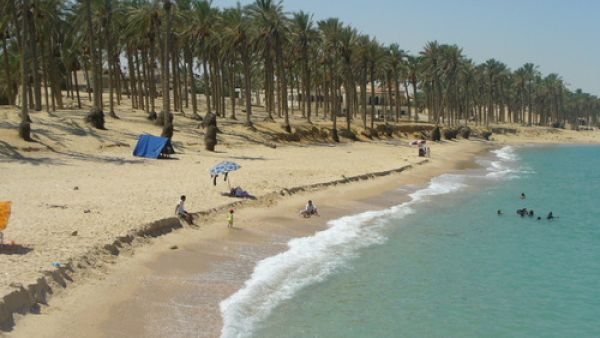- El-Arish in North Sinai has turned from a tourist resort to a militant bolt hole
- Residents are facing intimidation and violence from the ISIS-affiliated Sinai Province
- Egyptians also face abuse and killings from the security forces
- President El-Sisi urged officials to use "brute force" to stamp authority on the area
Last week the al-Rawdah Mosque just west of the Egyptian city of El-Arish witnessed the worst terrorist attack in the country’s modern city with over 300 people killed by suspected ISIS militants.
The brutal killings grabbed headlines across the world and were the latest in a string of deaths carried out by militants in El-Arish and surrounding areas in recent years.
The quality of life for many of the city’s residents has seen a steep decline, as the city and surrounding areas have become a battleground between ISIS-affiliated terrorists and the brutal army of the country’s strongman Abdel Fattah el-Sisi.
The ongoing insurgency has stemmed from the foundation of a group operating in the Sinai peninsula since 2011, known as Ansar Beit al Maqdis.
Initially, the group focused its efforts on attacking Israel and Jordan gas pipeline but the group changed tact around mid-2013, using the instability caused by El-Sisi’s military coup to launch attacks against the Egyptian military and police forces.
In the years since, El-Arish has turned from a bustling tourist town famed for its long beaches and palm trees into a no-go area and a living hell for those who reside there.
But it wasn’t always like this, the city once hosted tourists from across Egypt and the world and still boasts a Swiss Inn resort hotel.
One Trip Advisor review for an El-Arish hotel in mid-2014 boast of the “picturesque nature” found in the city.
Meanwhile, another visitor to the site branded the resort a “different type of vacation on the Mediterranean Sea”.
However, the days of tourism in the once popular city are a distant memory.
From 2013 onwards, life for the already struggling residents of North Sinai went into freefall amid a sea of brutality from both Jihadist groups and the Egyptian regime itself.
- Sinai Terror: Egyptians and Christians Lose Out in Terrorism Compensation Payouts
- More than 235 dead, 75 wounded in Sinai bombing, shooting attack
The situation in North Sinai reached a turning point in 2014 when following heavy losses, Egyptian forces stepped up their campaign against militants in the region.
Ansar Beit al Maqdis responded by aligning with ISIS later that year as many members pledged allegiance to the so-called Caliphate in return for weapons, training, and support from Syria and Iraq.
Jihadist attacks on civilians, including children, became commonplace and locals were eyed with suspicion by the security apparatus when police and military targets were hit by militant groups.
Rights groups believe that the Egyptian military’s actions in North Sinai from 2013 onwards may have actually inflamed tensions further and actually may have served as a recruitment tool for Ansar Beit al Magdis, later to be re-branded simply as Sinai Province.
In just a few short months, Egypt’s military carried out a number of unpopular measures including the forced eviction of over 3,000 families and destroyed acres of farmland and houses while allegedly attempting to destroy smugglers tunnels on the border with Gaza at Raffa.
“Destroying homes, neighborhoods, and livelihoods is a textbook example of how to lose a counterinsurgency campaign,” said Sarah Leah Whitson, the organization’s director in the Middle East and North Africa, in a report at the time.
“The Egyptian authorities provided residents with little or no warning of the evictions, no temporary housing, mostly inadequate compensation for their destroyed homes – none at all for their farmland,” a 2015 Human Rights Watch report said.
The government even went so far as to create a buffer zone of several kilometers around the Rafah border in a move which caused many other families to lose their homes.
However, this wasn’t the only activities carried out by the government which caused problems for the people of North Sinai.
The authorities also stand accused of widespread spread kidnapping and forced disappearances in the area.
At various points, residents in El-Arish complained of arbitrary arrests by the authorities in the region.
Videos also surfaced showing alleged extrajudicial killings and roadside executions by the very Egyptian troops who were supposed to be protecting the people of North Sinai.
Of course, it isn’t just the military which has made life difficult for local people.
ISIS also regularly targeted civilians and killed and tortured those it deemed guilty or co-operating with the Egyptian state.
On several occasions, the group also conducted checkpoints within El-Arish and in the surrounding areas where the group harassed citizens deemed for carrying out supposedly immoral behavior, such as teaching at local schools.
On the same token, it is also alleged by observers that militants would provide financial support to families whose homes had been destroyed by the military - provided, of course, that family members were willing to join the fight.
- UAE Blocks Former Egypt PM from Leaving After Announcement to Run for Presidency
- Sisi OKs 'Brute Force' in Military Crackdown After Sinai Mosque Attack
Both sides also attempted to recruit local Bedouin tribes, groupings local ignored and mistrusted by the Egyptian state and young men left with little or no opportunity to provide financially for their families in a climate of extreme economic hardship.
Despite hostilities, many of the tribes have now sided and taken up arms alongside the Egyptian military, seen as a lesser evil compared to the cancer of Jihadist brutality gripping the region.
Jihadists and the military sought to gain dominance through a policy of intimidation and fear while promising carrot to those who fell into line with their values and a severe stick to those who didn’t.
To add further insult to injury, the area suffers frequent electricity blackouts, communications outages and an almost complete media blackout with reports on North Sinai heavily discouraged by the government in Cairo.
The result is the people of North Sinai are left trapped between terrorism and state-sponsored abuse with their voices largely unheard by the outside world and those who have attempted to speak out have been faced with prosecution by the Egyptian state.
Earlier this week, President Abdel Fattah El-Sisi gave security officials the green light to use “all brute force” to gain complete control of the area within three months.
“I am mandating Maj. Gen. Mohammed Farid Hegazy before you and the entire people of Egypt to restore security and stability in Sinai,” Sisi said in a televised speech on Wednesday.
“With God’s benevolence and your efforts and sacrifices, you and the police will restore security and use all brute force, all brute force,” he said.
At a time when the people of North Sinai are grieving their dead relatives, their disappeared youth and their own hopes and dreams, further brutality does not allow them the peace to mourn their loved ones.







